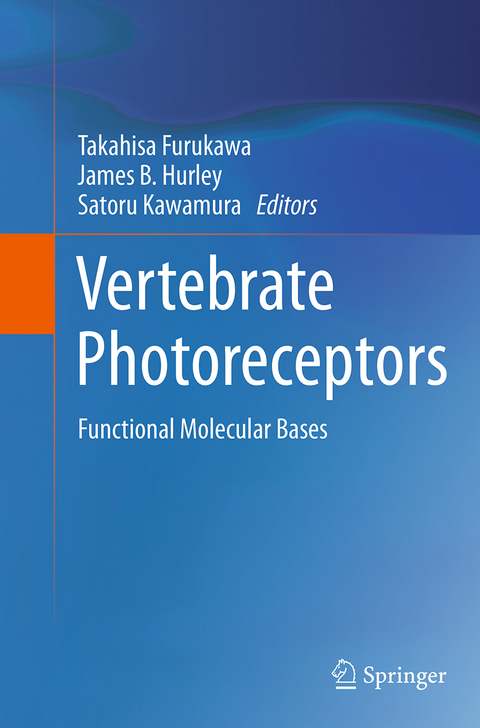
Vertebrate Photoreceptors
Springer Verlag, Japan
978-4-431-56335-8 (ISBN)
Photoreceptors are the most deeply studied sensory receptor cells, but readers will find that many important questions remain. We still do not know how photoreceptors, visual pigments and their signaling pathways evolved, how they were generatedand how they are maintained. This book will make clear what is known and what is not known. The chapters are selected from fields of studies that have contributed to a broad understanding of the birth, development, structure, function and death of photoreceptor neurons. The underlying common word in all of the chapters that is used to describe these mechanisms is “molecule”. Only with this word can we understand how these highly specific neurons function and survive. It is challenging for even the foremost researchers to cover all aspects of the subject. Understanding photoreceptors from several different points of view that share a molecular perspective will provide readers with a useful interdisciplinary perspective.
Takahisa Furukawa MD. Ph. D., Professor Protein Institute, Osaka University, Osaka, Japan. James B. Hurley, Ph. D., Professor Department of Biochemistry, University of Washington, Seattle, USA. Satoru Kawamura, Ph. D., Professor Graduate School of Frontier Biosciences, Osaka University, Osaka, Japan.
Chapter 1 Visual Pigments.-Chapter 2 Phototransduction in Rods and Cones.-Chapter 3 Visual Cycle.-Chapter 4 Adaptation.-Chapter 5 Energy Metabolism.-Chapter 6 Photoreceptor Development.-Chapter 7 Photoreceptor Synapse -- Synaptic Transmission.-Chapter 8 Photoreceptor Synapse -- Development of Synapse.-Chapter 9 Cell fate Determination.-Chapter 10 Polarity and Layer Formation.-Chapter 11 Photoreceptor Degeneration.- Chapter 12 Photoreceptor Regeneration.- Chapter 13 Pineal Organs.
| Erscheinungsdatum | 26.08.2016 |
|---|---|
| Zusatzinfo | 47 Illustrations, color; 19 Illustrations, black and white; VIII, 349 p. 66 illus., 47 illus. in color. |
| Verlagsort | Tokyo |
| Sprache | englisch |
| Maße | 155 x 235 mm |
| Themenwelt | Medizin / Pharmazie ► Studium |
| Naturwissenschaften ► Biologie ► Evolution | |
| Naturwissenschaften ► Biologie ► Humanbiologie | |
| Naturwissenschaften ► Biologie ► Zellbiologie | |
| Naturwissenschaften ► Biologie ► Zoologie | |
| Schlagworte | Light adaptation • Phototransduction • Pineal organs • retina • Visual cycle • visual pigments |
| ISBN-10 | 4-431-56335-0 / 4431563350 |
| ISBN-13 | 978-4-431-56335-8 / 9784431563358 |
| Zustand | Neuware |
| Haben Sie eine Frage zum Produkt? |
aus dem Bereich


